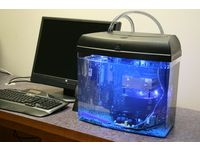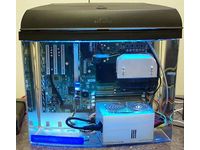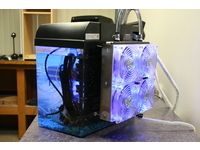Soak Your PC in Mineral Oil: Puget Systems Announces DIY Aquarium Cooling
Been eyeballing that old aquarium in the garage (the fish long since gone) for your next extreme system mod and cooling solution? Probably not, but Puget Systems now offers kits for those of you that are interested and brave enough to venture into submerged cooling mods.

Custom PC maker, Puget Systems, has announced the availability of their DIY ‘Aquarium PC’. Puget claims that they have been running their own system for over a year with no ill effects on the hardware submerged within. Some people may cringe at the thought, but mineral oil is completely non conductive of electricity – meaning you could drop anything electronic into it and it will continue to run just fine.
Standard liquid cooling systems have nothing on this baby. Since the entire motherboard and everything attached to it gets entirely submerged into mineral oil. With the aid of a pump and external radiator, everything in the aquarium gets it share of ‘liquid cooling’. As depicted in the images, you can see that the power supply is even inside the tank. A cooler is installed on the CPU – but really all it is there for is to move the mineral oil across the fins as though it were air.
Now it doesn’t take a rocket scientist to figure out that standard fans can move air a lot easier than liquid – since liquid is heavier and denser than air, you may want to ensure that the fan on your cooler and in your PSU will stand up to the increased stress of moving liquid. All current fan manufactures of course do not have a ‘liquid’ rating on their fans, so this would be entirely a trial by fire situation. Puget was unavailable at this time for comment regarding this issue.



We can also see, according to the images anyway, that the hard drives are not contained within the tank itself – this would be for obvious reasons, anything gets inside your drive and its pretty much toast since what goes on inside them happens at a severely high degree of accuracy – something you do not want to mess with. This leaves you with eSATA for your storage option. You could however submerge solid state drives into mineral oil without issue. Keep that in mind. Your CDs and DVDs will not be going for a swim either.
Puget would also like to caution potential buyers that submerging your hardware into any liquid will obviously void your warranty – could you imagine returning a oil-logged video card to EVGA? Yeah, not going to happen. Puget also mentions that mineral oil is extremely difficult, if not impossible, to clean from your hardware – making your hardware dunking madness a one way ticket. Don’t put it in there if you don’t plan on leaving it in there.
The system can be purchased in two separate pieces, the Aquarium Module, and the Cooling Module. Puget’s site claims the cooling module is only needed for ‘high-end’ systems – this would imply that lower-end hardware would not require the massive radiator module. Since nobody buying this would be planning on dunking 8500GTs, it’s a good assumption that you will need the cooling module as well.
Get Tom's Hardware's best news and in-depth reviews, straight to your inbox.
The Aquarium Module costs US$312.50 and the Cooling Module US$375.00. More information and parts can be found at the Puget Systems Website.
-
actually...according to Puget's own website, their newest version of the Submerged PC does have the hard drive submerged. They did it by using a Solid State drive.Reply
-
Shadow703793 How is the Toms oil cooled PC now? Did you guys take it down or is it still running/being used?Reply -
estreetguy symotaactually...according to Puget's own website, their newest version of the Submerged PC does have the hard drive submerged. They did it by using a Solid State drive.Reply
Actually...Try reading it again, he said you COULD submerge solid state drives. Jeeze, do you people even read at all ? -
kelfen This could turn out really good if they some how are able to solve fan promblems customize them in such a way that it would move the mineral oil as if it were air or have fans on the top ventalating the hot air out of the case. and some how bring cool air in. plus bring on the mechanical fish!!!Reply
-
Neog2 This is not anything new. I remember back in highschool in the late 90'sReply
I did a science fair project about the usefulness of non conductive liquids, and actually had a liquid cooled machine similar to this but
a lot less pretty.
And I think tomshardware actually made a machine like this about two years ago.
Cool stuff but yeah like they said. Once its submerged there
really is no way to clean it since its oil and anything
that would be used to clean it would probably be corrosive. -
jerreece So for about $700 you can have your own computer in a fish tank.......Reply
What stupid product in they invent next? I'd rather put $700 into system upgrades, or something more useful. a good case and some fans does well enough for my tastes. -
smalltime0 jerreeceSo for about $700 you can have your own computer in a fish tank http://en.wikipedia.org/wiki/aquarium .......What stupid product in they invent next? I'd rather put $700 into system upgrades, or something more useful. a good case and some fans does well enough for my tastes.Its more than that.Reply
If you are overclocking madly this is brilliant, instead of the standard water block solution for liquid cooling, all the components are submerged, thus all components are cooled. As an added bonus it should be extremely silent.
If you do not realise the significance of a completely submerged unit you should probably not be reading these news reports.
Of course that aquarium looks pretty standard, like something they got for $80 at the petshop, I seriously doubt its worth what they are asking.
Now are the fans on the radiator temp controlled?